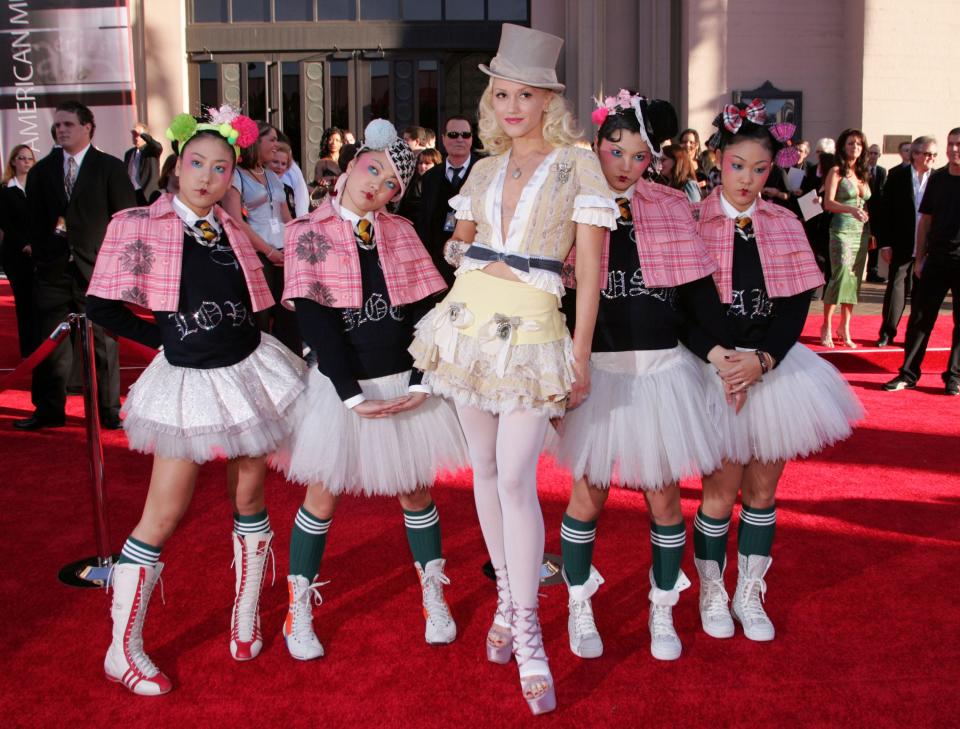Gwen Stefani draws backlash for saying 'I'm Japanese' in response to cultural appropriation charges
- Oops!Something went wrong.Please try again later.
Gwen Stefani is once again addressing longstanding charges of cultural appropriation, doubling down on her controversial Harajuku era.
The "Hollaback Girl" singer, 53, has faced decades of cultural appropriation accusations, from wearing a bindi (a South Asian religious symbol) in the 1990s to her 2005 "Luxurious" music video, in which she imitated Hispanic culture and seductively danced in an Our Lady of Guadalupe shirt. In 2012, Stefani donned Native American attire in No Doubt's "Looking Hot" music video, which depicted a Cowboys vs. Indians fight with teepees and feathered headdresses.
But the most serious charge of cultural appropriation came from the Japanese-inspired imagery Stefani used heavily on her 2004 album "Love. Angel. Music. Baby.," which birthed her No. 1 single "Hollaback Girl" along with her Harajuku Girls entourage and brands such as Harajuku Lovers fragrance.
Stefani, who has previously disagreed with criticisms of her Harajuku era, doubled down when asked about the backlash in a new interview published Tuesday. This time, she cited her father's job at Yamaha as her inspiration when speaking to Allure's Jesa Marie Calaor, who is Asian American.

"That was my Japanese influence and that was a culture that was so rich with tradition, yet so futuristic (with) so much attention to art and detail and discipline and it was fascinating to me," Stefani said, adding that her own visit to Harajuku led to an epiphany.
"I said, 'My God, I'm Japanese and I didn't know it."
Her comments, which are similar to those she's made in the past, drew backlash online. USA TODAY reached out to Stefani's rep for further comment.
"gwen stefani telling an asian american interviewer that she identifies as japanese is the kind of oblivion i'm trying to channel in this dark cruel world," one user tweeted.
"@gwenstefani maam. You are not Japanese. You are not Asian like us You are not a minority like us. Being a superfan of Asian culture does not make you one of us STOP," another user wrote.
"as much as I loved 90s gwen stefani in the 90s this unending parade of cultural appropriation, and a clear desire to ignore any criticism of her behavior, or learn anything from it, has really kind of ruined it for me," one user wrote.
yeah, i'm not gonna lie, as much as I loved 90s gwen stefani in the 90s this unending parade of cultural appropriation, and a clear desire to ignore any criticism of her behavior, or learn anything from it, has really kind of ruined it for me.
— Scott Hussey 🍲 (@designerscott) January 10, 2023
In response to the success of her brands inspired heavily by Japanese culture, Stefani told Calaor "a hit is a hit."
"If (people are) going to criticize me for being a fan of something beautiful and sharing that, then I just think that doesn't feel right," she continued. "I think it was a beautiful time of creativity… a time of the ping-pong match between Harajuku culture and American culture… (It) should be okay to be inspired by other cultures because if we're not allowed then that's dividing people, right?"
The former "Voice" coach also shot down criticisms about appropriating Latinx and Hispanic culture, saying she identifies with both.
"The music, the way the girls wore their makeup, the clothes they wore, that was my identity," she said. "Even though I'm an Italian American — Irish or whatever mutt that I am — that's who I became because those were my people, right?"
Appreciation vs. appropriation
Stefani is one of many celebrities who has tried to walk the fine line between cultural appreciation and appropriation.
Dr. Neal Lester, founding director of Project Humanities at Arizona State University, defined cultural appropriation to USA TODAY as "stealing something from a culture that is not one's own and reaping the benefits or profits from it."
Lester added that appropriation "reduces something to a kind of performance."
In comparison, cultural appreciation "is when someone seeks to understand and learn about another culture in an effort to broaden their perspective and connect with others cross-culturally," according to Greenheart.org, an organization that facilitates cultural exchange programs.
Cultural appropriation vs. appreciation: Justin Bieber’s dreadlocks, Gwen Stefani music video sparks debate
Contributing: Cydney Henderson
This article originally appeared on USA TODAY: Gwen Stefani denies Harajuku cultural appropriation, draws backlash

